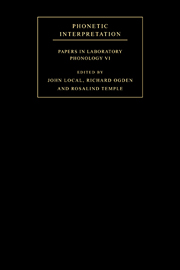Book contents
- Frontmatter
- Contents
- List of contributors
- Acknowledgements
- Introduction
- Part I Phonological representations and the lexicon
- Part II Phonetic interpretation and phrasal structure
- 6 Release the captive coda: the foot as a domain of phonetic interpretation
- 7 How many levels of phrasing? Evidence from two varieties of Italian
- 8 Domain-initial articulatory strengthening in four languages
- 9 External sandhi as gestural overlap? Counter-evidence from Sardinian
- 10 Commentary: Consonant strengthening and lengthening in various languages
- Part III Phonetic interpretation and syllable structure
- Part IV Phonology and natural speech production: tasks, contrasts and explanations
- References
- Index of names
- Index of subjects
10 - Commentary: Consonant strengthening and lengthening in various languages
Published online by Cambridge University Press: 22 September 2009
- Frontmatter
- Contents
- List of contributors
- Acknowledgements
- Introduction
- Part I Phonological representations and the lexicon
- Part II Phonetic interpretation and phrasal structure
- 6 Release the captive coda: the foot as a domain of phonetic interpretation
- 7 How many levels of phrasing? Evidence from two varieties of Italian
- 8 Domain-initial articulatory strengthening in four languages
- 9 External sandhi as gestural overlap? Counter-evidence from Sardinian
- 10 Commentary: Consonant strengthening and lengthening in various languages
- Part III Phonetic interpretation and syllable structure
- Part IV Phonology and natural speech production: tasks, contrasts and explanations
- References
- Index of names
- Index of subjects
Summary
The three papers by D'Imperio and Gili Fivela (Chapter 7), Keating, Cho, Fougeron and Hsu (Chapter 8) and Ladd and Scobbie (Chapter 9) all present experimental data on lengthening or strengthening of consonants that are word- or domain-initial in a number of languages. Ladd and Scobbie's acoustic analysis is of an extensive corpus of continuous speech from the Logudorese variety of Sardinian in which they provide a strong challenge to a recent set of studies that have modelled consonant assimilation predominantly as gestural overlap. D'Imperio and Gili Fivela's analysis is of vowel and consonant lengthenings due to syntactic and prosodic boundaries and of an external sandhi effect of ‘Raddoppiamento (Fono)Sintattico’ that occurs in many dialects of Italian. The study by Keating et al. as well as their many earlier analyses, provides an impressive range of articulatory data which point to a close link between prosodic boundary strength and domain-initial consonant strengthening. The three papers are very different in their theoretical assumptions and the range of research questions that they address, but they are nevertheless interlinked by a common theme of the production of prosodic structure and its effect, in particular, on word-initial consonants.
The focus of the paper by Ladd and Scobbie is an analysis of assimilation in Sardinian and the extent to which this can be modelled as a categorical phonological modification or as the result of phonetic gradient effects.
- Type
- Chapter
- Information
- Phonetic InterpretationPapers in Laboratory Phonology VI, pp. 183 - 194Publisher: Cambridge University PressPrint publication year: 2004

